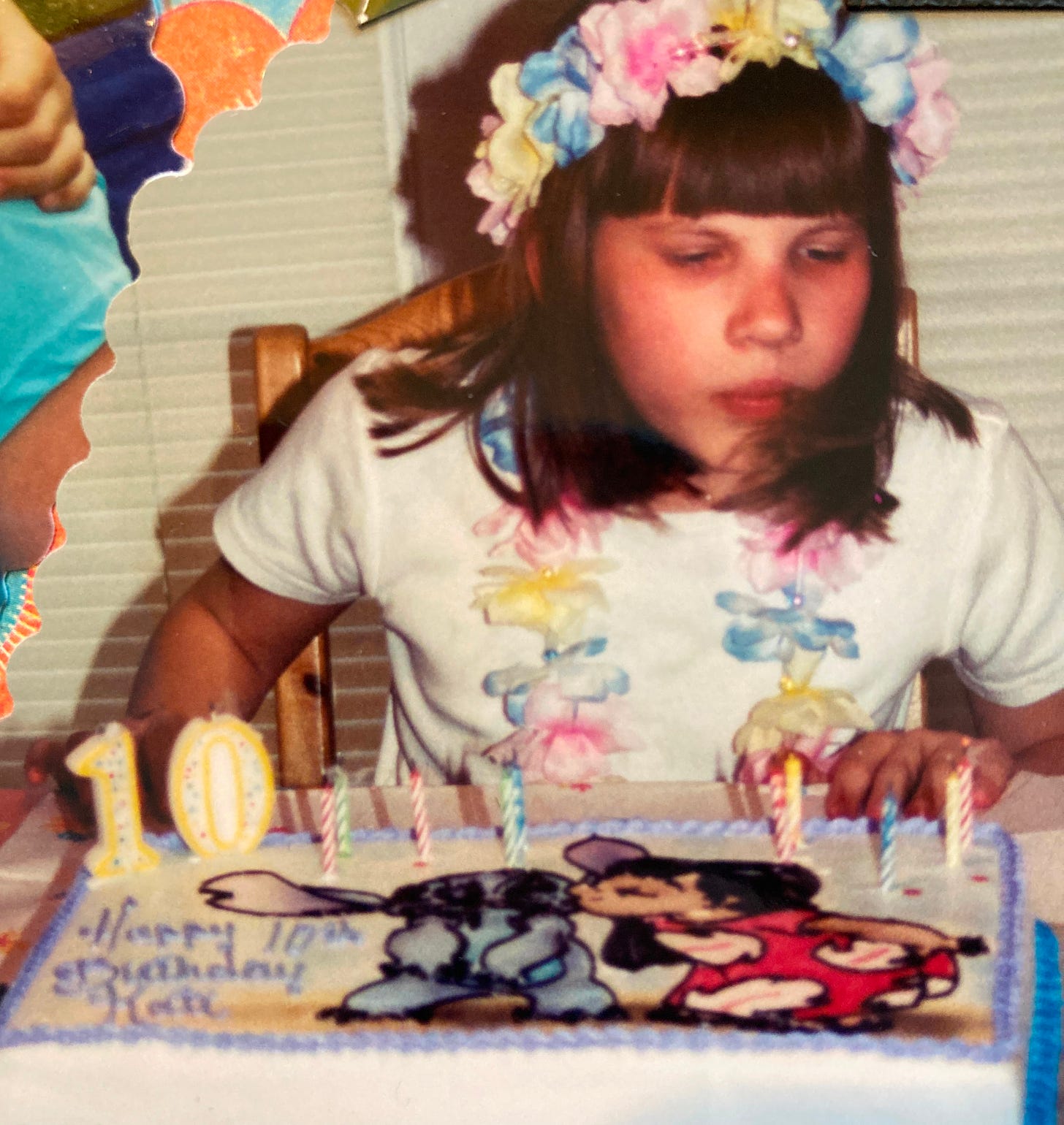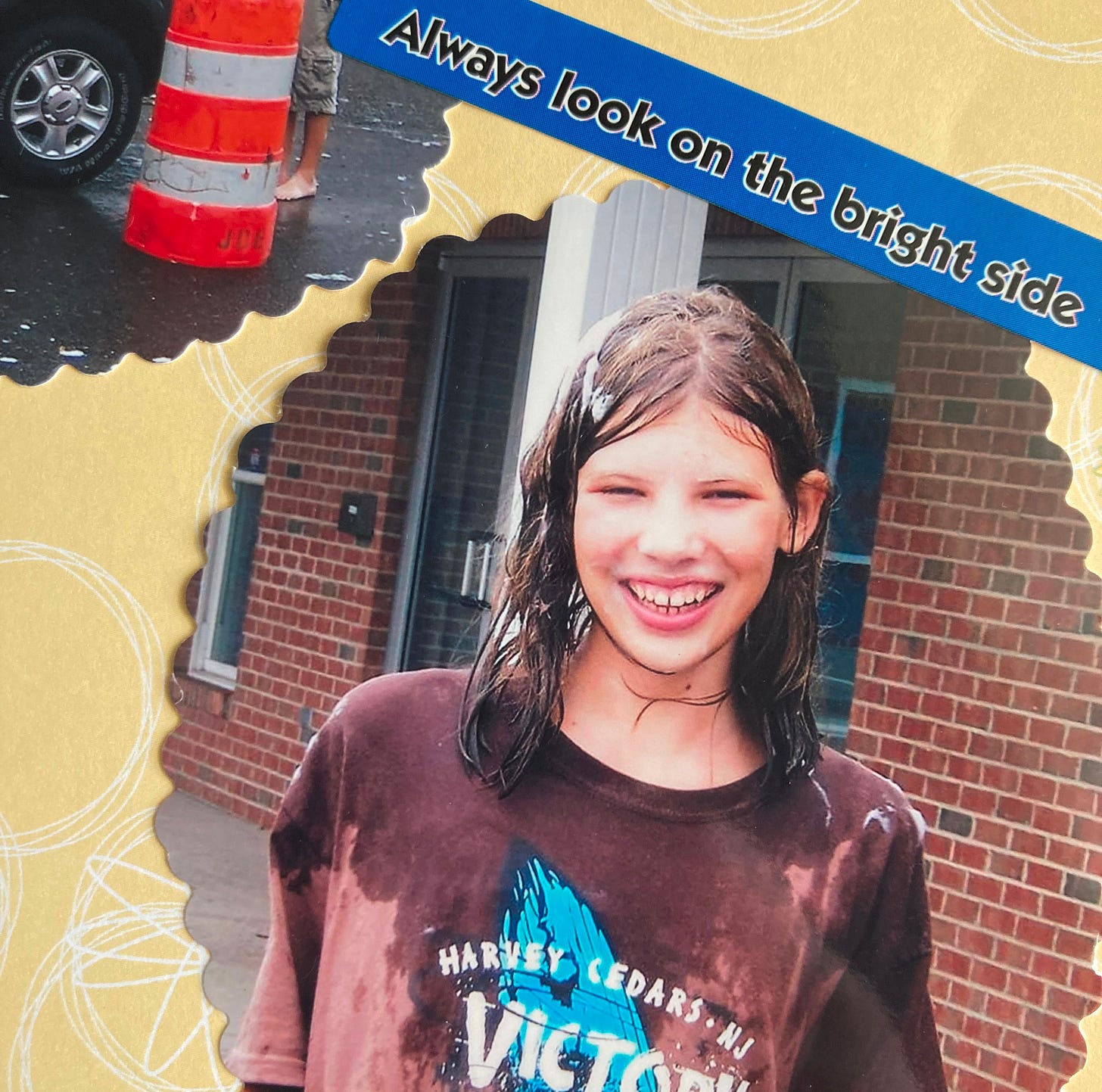forgetting how to read: memories from childhood OCD
I look around at my classmates like I’m looking through a fogged mirror, thinking maybe if I blink hard enough it will all feel real again.
fourth grade
I’m in the middle of language arts when my brain starts asking questions I can’t answer.
What are words, anyway? How can you know if you really understand all these letters on the page?
What if you don’t?
What if you can’t?1
I try to quiet the questions, shush them back to where they came from, but they just get louder and louder.
Months later, I break. My parents look puzzled at the straight A’s on my report card while I flail and sob in the living room and tell them I can’t read.
Soon the questions bleed beyond words and into numbers, too.
What is math? What is anything?
Writing comes next. I write a word, stare at it for a long time, then erase the last letter and write it again. And again.
And again.
I scribble in my dragonfly beaded journal, doing the best I can with ten years of vocabulary to explain what’s wrong with me.
“It’s like I see things but don’t understand them.”
I’m ten years old and my homework takes me hours. My college-ruled notebook paper is crinkled with dried tears and eraser shavings. I look around at my classmates like I’m looking through a fogged mirror, thinking maybe if I blink hard enough it will all feel real again.
Sometime in the middle, I start crying and can’t stop. Every day for two weeks I lose my sh*t, which is a word I just learned from a friend. (She asked while we stood in line for hot lunch if I wanted to know the s-word. I told her no, so she whispered the four letters into my ear anyway.)
I don’t know why I’m so upset. I tell my teachers it’s because I miss my mom even though I’m double digits old, or because my brain is overthinking reading and writing and blinking.
One day I tell my gym teacher the truth, that I’m just sad and I don’t know why. She tells me to get back on the basketball court.
Eventually, the adults in my life diagnose me with going through puberty. I’m told this is just what happens when you start growing up.
This is just what happens.
middle school (part one)
By the end of sixth grade I can read again, but now I’m afraid of everything.
I close my eyes when walking by mirrors just in case Bloody Mary appears unsummoned.
I look behind the shower curtain for intruders before sitting on the toilet.
I double-triple check the locks on all the doors and windows at night.
In seventh grade my Pioneer Girls troop (think church Girl Scouts) goes on a retreat to a camp in the middle of the woods, which I know for a fact is where most horror movies take place even though I’ve never seen one. Knots in the wall of our cabin look like eyes to me, so after lights out I ask someone to switch beds so I can escape from their stare. There’s no way to avoid the ones in the bathroom stall.
Home doesn’t feel much safer. It takes me over an hour to fall asleep, so during that time lie in bed and listen. Every creak and shift in the house is a potential threat, a serial killer poised with an axe at the bottom of our staircase.
Several times a night I sprint to my parents’ room, tears in my eyes, and ask my dad to check the first floor. I stand shivering in my floral footie pajamas (the ones that cool eighth graders said weren’t cool) while I wait for his safe return. Wondering if I’m sending him to his death.
He always comes back, and we do it all over again the next night.
It’s around this same time that I start moving things. I’ll be lying in bed, talking with my sister, when I see something on my dresser (a trophy, a photo frame) that doesn’t look quite right. I try to ignore it and focus on our conversation, but that panicked, twisty feeling in my gut won’t go away.
So I get out of bed and turn the thing about a sixteenth of an inch to the right.
A few minutes later, I do it again.
One more time. Just to be sure.
middle school (part two)
There’s this prayer I pray every night, a list of things I’d like God to protect me from. I repeat it in the same order, sometimes twice to be sure He heard it.
The list grows as I learn of more things to be afraid of, including men who walk into schools with metal in their hands.
The problem with this prayer, though, is that I’m not sure anymore if anyone is listening. That’s because in sixth grade, we do an entire unit in science class about creationism versus evolutionism.
Creationism wins, of course, because it’s a Christian school and God always wins here.
Even still, one day while sitting in class I hear a whisper at the base of my neck. It shivers all the way down my spine.
“What if evolution really is true? What if God isn’t real?”
The thought lives in my brain for months, ignoring all the compelling arguments I shout at it from behind my science notebook.
It’s there when I go to church, when I pray, when we do our morning pledges to the American flag, the Christian flag, the Bible.
It sits next to me on the pew during our Wednesday chapel and stalks me through the woods during our school’s fall retreat.
“What if God isn’t real? If you don’t believe in God, that means you’re going to hell. Hell might not even be real, but if it is then that’s where you’ll be.”
I begin to pray The Prayer, the one I first said by my bedside as a four-year-old. I tell God that I believe in Him, that I believe in His Son who died on the cross for my sins so I can have eternal life and go to heaven.
I pray this prayer throughout the day and at night. Any time I feel that wisp of doubt curl around my heart, I pray. Sometimes I pray it two or three times in a row because it didn’t feel right the first time. I need to make sure God knows I really, truly mean it.
I don’t know how many times I pray it, but I do know that it’s never enough. I can’t be one hundred percent sure I believe in God, which means I can’t be one hundred percent sure I’m going to heaven.
(If I’m honest with myself, heaven scares me, too. How can anyone live forever without eventually wanting to die?)
Though I have never been officially diagnosed with OCD, I can vividly remember periods of my life that were severely affected by intrusive and obsessive thoughts followed by mental and sometimes physical compulsions. Though one of the first experiences I remember happened in second grade, fourth grade was when they became all-consuming.
Even as a child I recognized that these thoughts were irrational, yet I couldn’t loosen the suffocating grip they had on my mind. I was afraid to tell anyone, including my parents, what was happening in my brain, convinced they would think I was as crazy as I felt. And no matter how much or how hard I prayed for God to take these relentless thoughts away, I still felt locked in a losing battle with my own mind.
This particular aspect of my mental health plays a large role in my story about healing from s*xual shame. As I continue sharing more about that story in this space, I’ll also be sharing these glimpses from my childhood and teenage years that show what it was like to grow up with a brain that often felt broken.
If you’re someone who has struggled in a similar way, I hope these words make you (and maybe your childhood self) feel a little less alone. And if you’re curious about these specific experiences or can relate in any way, please feel free to reach out to me directly! I’m not a mental health professional by any means, but I will gladly listen to your story and/or point you to people and resources that can help.






As someone who has only been diagnosed as an adult and has felt out of place/crazy/angry/etc/etc their whole life, this hits. You're not alone and I hope you're doing okay
Thank you so much for this! I felt so held by your piece! I was just diagnosed with OCD and I’m thinking back to my childhood when it first got loud, feeling a lot of grief for younger-me who didn’t have any support. Appreciate your work 💕